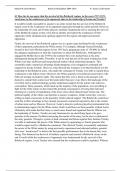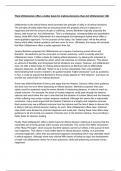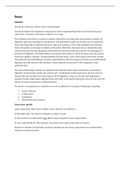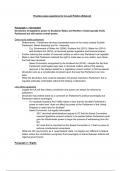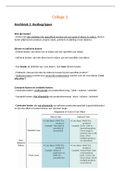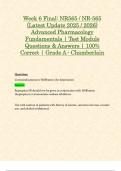Q: How far do you agree that the survival of the Bolshevik regime, in the years 1917-1921,
owed more to the weaknesses of its opponents than to the leadership of Lenin and Trotsky?
It would be totally reasonable to assume to an entire extent that the survival of the Bolshevik
regime owed to the weaknesses of its opponents especially through the earlier periods. However,
the leadership of Lenin and Trotsky played a similarly fundamental role in ensuring the survival
of the Bolshevik regime as they were able to identify and exploit the weaknesses of their
opponents whilst simultaneously igniting support for the regime and oppressed internal
opposition.
Firstly, the survival of the Bolshevik regime was to a great extent facilitated by the weaknesses
of their opponents, particularly the White armies. For example, although General Kolchak,
located in the Urals-Siberian regions in late 1918 had a gargantuan army of 150,000, he lacked
the adequate organisation or land fare experience to attack the Bolsheviks. Although they
engaged the Bolsheviks in late 1919 by the summer they were pushed back as his army
disintegrated during the battle. Therefore, it can be seen that one of the main weaknesses of the
Whites was their inefficient and inexperienced leaders which undermined progress. This
essentially made a numerical advantage disadvantageous as he struggled to command and
organise his troops in battle. However, what allowed this weakness to be that beneficial was the
leadership of the Bolshevik army, who under the command of Trotsky were able to exploit those
weaknesses to the fullest extent. Moreover, the White generals were political conservatives who
believed strongly in property rights. This meant that they were a threat to the peasants who
desired to cement their control over the lands rather than give it up. Due to the landscape of the
Civil War such a political ideology greatly undermined support for the armies who relied on
conscription. Many peasants, which made up the majority of the population, were unwilling to
fight for the white armies as they feared the potential consequences of losing their land and
returning to a system of exploitation of the lower class which characterised Tsarist rule. The
political rigidity of the whites was therefore a massive weakness. Unlike Lenin they were not
willing to make concessions to the peasantry which reduced support. The Bolsheviks could have
used this to their advantage as they already possessed a numerical superiority due to the control
of urban areas such as Moscow. However, Lenin’s attractive policies played an instrumental role
in undermining support for the White armies which would have not been possible without Lenin.
Ultimately what made the Red Army so much more feared and organised than the Whites was
the leadership of Trotsky. Trotsky not only functioned as an electrifying figure who gave
speeches to the masses of soldiers increasing the morale of the army, but he also revolutionised
the army generals. Through a system of dual command and threats against their families Trotsky
was able to undermine the power of the White armies by appointing ex-Tsarist generals who
would be supervised by a Bolshevik commissar. This allowed Trotsky to essentially undermine
the power of the White armies by using previously experienced and educated military generals
who were “incentivised” to deliver the best possible performances due to the threats they were
facing. This balanced out the level of military expertise and ensured a Bolshevik victory in the
end. Overall whilst the weaknesses of opponents were instrumental for the survival of the
Bolshevik regime, it was Trotsky who ensured that the weaknesses could be exploited. Without

